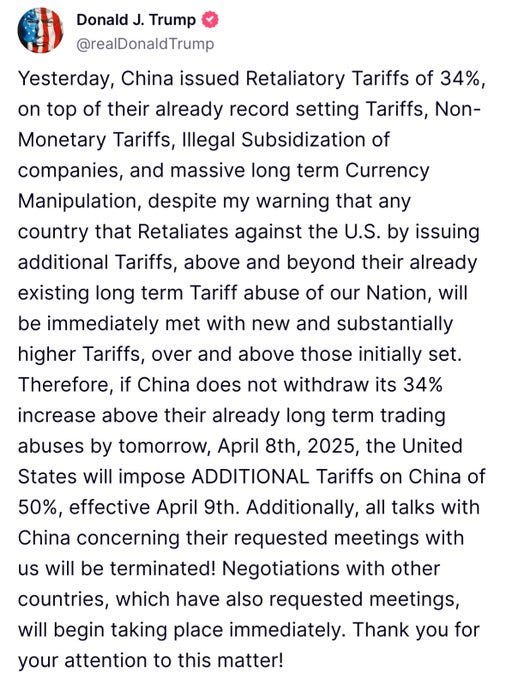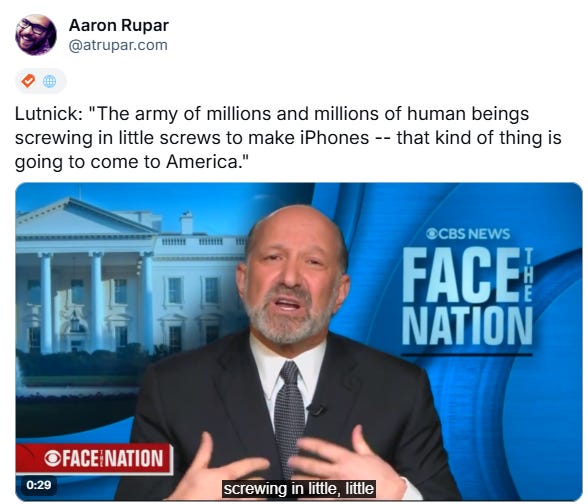“You want to believe that there must be intelligent and honest people somewhere inside the Trump economic policy trying to limit the damage ... but as with the existence of leprechauns, there is no empirical basis for this belief”. — David Frum
Happy Monday.
Over the weekend, the Trump Administration tried to calm the panic by sending out its best and its brightest — by which we mean the broken, inane, misfit, stone-deaf millionaires who sowed confusion, and contradicted themselves. The tariffs were subject to negotiation; the tariffs were non-negotiable; the tariffs will create great new American jobs. Actually, they’d create robot jobs. ’Twas brillig, and the slithy toves/ Did gyre and gimble in the wabe:/ All mimsy were the borogoves,” the Secretary of Commerce explained. And the mome raths outgrabe.1
World markets listened to all of this today and collectively concluded, “Oh shit”.
Posted former Treasury Secretary Lawrence Summers “ I've never seen as much incoherence and irrationality as we saw on television today (from Trump Administration officials). This Administration doesn’t have a coherent message on why it's doing the largest tax increase the country's had in 50 years. Usually when you do something consequential, you have a clear rationale that's consistently delivered, and we're not getting that.”2
Even Elon Musk has his doubts. And the rest of the world is fuqqed.
If only you had been warned
Right-wing influencer Richard Hanania has some regrets.
Belatedly — in just the last few weeks apparently — Hanania realized that returning Donald Trump to power was a bad idea and that “Kakistocracy as a Natural Result of Populism.”
“For those asking: yes, voting for Trump was a mistake.” he says now. “I thought we'd get a repeat of the first administration, but we didn't. The signs were there, I just did not take my own ideas about the awfulness of Trump and MAGA seriously enough.”
“Nobody,” he wrote last week, “knew how bad.”
Nobody?
[Lord, give me strength. Really.]
Here’s what Hanania wrote:
When I said I would vote Trump in 2024, I was clear eyed about the human capital problem on the right. I just thought that the basic ideological basis of conservatism – free markets, individual rights, tough on crime and foreign adversaries – was sound and enough of it was left over to make even a Republican president this personally flawed a better option.
Yet I was expecting something of a repeat of the first administration, with Trump restrained by traditional conservative ideas, personnel, and institutions. As it turned out, the old Reagan coalition was becoming increasingly hollow, replaced by Trump worship, online edgelordism, and late arriving scammers like crypto bros and MAHA. The signs were there, and I talked extensively about how Trump was becoming something of a cult leader with few checks on his whims and desires. But I must’ve thought that maybe Jared Kushner would just wait until he fell asleep around noon and then start making all the right calls. Or that it would be Elon, but that Elon was a smart guy with libertarian views instead of someone whose brain had been completely melted by right-wing internet slop.
FFS does not seem to do this justice.
“I don’t want to be too harsh on Hanania here — his public admission that he was wrong is commendable,” the British writer Ben Cohen wrote. “But ‘nobody knew how bad’ this would get? Really?”
There are hundreds of publications, thousands of public figures, and an entire political party that has spent almost a decade trying to tell America how insane Donald Trump is, and why voting him into power could very well precipitate the end of democracy in America. The man tried to overthrow the goddamn government when he lost a free and fair election.
Seriously. I’m, taking a deep breath here.
That sainted first term was, in fact a feculent dumpster fire and a million people ended up dying of COVID. But I understand that some people voted for Trump in 2016 and 2020 because they lived in an epistemic bubble — one of the alternative reality silos that has grown up on the right — the kind that would take someone like Dan Bongino, Charlie Kirk, or Howard Lutnick seriously. I get that millions of folks simply didn't know all of the details — the frauds, the bigotry, the corruption, the toxic narcissism. I can even get my head around the fact that there were deplorables who rationalized the malfeasance or even got a kink out of his performative menace.
But how do you explain a quasi-smart guy like Hanania, who watched the whole 2024 campaign in real time? What bizarre turn in the intellect could make somewhat watch Trump in Full— a convicted felon, who pledged to pardon the J6 rioters; a sexual abuser who threatened a regime of retaliation; a serial liar, grifter, and fraudster who had incited a mob to attack the capitol based on his own Big Lie — and think “maybe it won’t be so bad?”
And why should anyone be surprised by Trump’s shambolic trade war? “Tariff” he told us over and over again, was his favorite word.
But Hanania still thought there would be grownups in the room who would restrain his worst instincts. This turned out to be a delusion, wrapped in an illusion, bound tightly by his wishful thinking.
For the record: Some of us knew how bad it would be. Lots of us knew. It was right there. In front of your eyes. Every day. And we tried to warn you. Over and over and over and over again.
So, Richard, welcome to the resistance. But what the fuq were you thinking?
**BONUS: If only Jamie Dimon had been warned…
There is no “strategy”
Unlike Hanania, Bloomberg’s Tim O’Brien has studied Trump for decades. And, if you actually understand Trump, he writes, you know there is no strategy. Only grudges.
Given Trump’s worldview, pondering “strategy” is a fool’s errand and asking “What is the administration trying to accomplish?” is the wrong question.
There isn’t a strategy. Trump operates in strategy-free zones. But he has overt and longstanding goals.
His primary aim is to address his grievances with the world, not to craft substantive or even rational public policy. An inordinate number of his goals involve self-aggrandizement or self-preservation. Many others are performative and unhinged. A meaningful number of his ambitions involve seeking revenge on people, institutions, and organizations that he believes have taken advantage of him, the country or his supporters. He has a long history of labeling America’s trading partners, some of whom are the US’s closest allies, as pickpockets and he’s now in a position to do something about it.
Exit take: Don’t expect Congress to do squat.
**
Meanwhile, Trump just escalated:
Thank you for subscribing!
I know that there are a lot of claims on your time and your pocketbook. But please take a moment to consider supporting us — especially amidst this tsunami of crazy.
To the Contrary is a reader-supported publication. There are no investors. No sugar daddies.
And look who’ll find here: Anne Applebaum, David French, Jim Acosta, Adam Kinzinger, Tom Nichols, Olivia Troye, Tim O’Brien, Peter Wehner, Ben Wittes.. and a host of others.
To receive new posts — including cross posts podcasts and videos— please consider becoming a free or paid subscriber. (And I’m immensely grateful for your generous support.)
Monday dog
Auggie has some room to play.
…
.“Beware the Jabberwock, my son!
The jaws that bite, the claws that catch!
Beware the Jubjub bird, and shun
The frumious Bandersnatch!”
He took his vorpal sword in hand;
Long time the manxome foe he sought—
So rested he by the Tumtum tree
And stood awhile in thought.
And, as in uffish thought he stood,
The Jabberwock, with eyes of flame,
Came whiffling through the tulgey wood,
And burbled as it came!
One, two! One, two! And through and through
The vorpal blade went snicker-snack!
He left it dead, and with its head
He went galumphing back.
“And hast thou slain the Jabberwock?
Come to my arms, my beamish boy!
O frabjous day! Callooh! Callay!”
He chortled in his joy.
’Twas brillig, and the slithy toves
Did gyre and gimble in the wabe:
All mimsy were the borogoves,
And the mome raths outgrabe.
— The Jabberwocky, by Lewis Carroll
Howard Lutnick, the billionaire commerce secretary, struck an aggressive note on CBS News’s Face the Nation in which he portrayed the tariffs as here to stay. Asked whether there was a chance that tariffs would be postponed to allow countries to negotiate a deal with Washington, he replied: “There is no postponing – they are definitely going to stay in place for days and weeks, that is sort of obvious.”
Lutnick added that Trump intended to “reset global trade”.
“The president has made it crystal, crystal clear,” he said.
However, two other cabinet members gave the opposite take, suggesting that negotiations with individual countries were very much on the cards. Scott Bessent, the treasury secretary, told Meet the Press on NBC News that Trump had “created maximum leverage for himself, and more than 50 countries have approached the administration about lowering their non-tariff trade barriers, lowering their tariffs, stopping currency manipulation”.
The agriculture secretary, Brooke Rollins, echoed Bessent by flagging up possible talks. “We’ve got 50 countries that are burning the phone lines into the White House,” she told CNN’s State of the Union.
..











People – including myself – did not understand why Trump went golfing when it appears that the whole world is facing an economic crisis – which he implemented. Wall Street crashed two days in a row and has now lost over a trillion dollars. The Financial Times said: “Donald Trump’s top economic officials vowed to press ahead with bruising tariffs on imports from around the world, rejecting fears of a looming recession as investors braced for new turmoil in financial markets.”
This morning, Sunday, April 6th, I received an email from an old friend who did not identify the author of the attached long message. However, the posting contained news that I found essential to be shared with others – as many “others” as possible. Here is what it said:
“It’s simple: the emergency isn’t something he’s reacting to — it’s something he’s building. Trump recently declared a national economic emergency under the International Emergency Economic Powers Act (IEEPA) — granting himself sweeping authority over international trade by labeling foreign economic practices an ‘unusual and extraordinary threat.’
But here’s the real play: by declaring a national emergency, Trump didn’t just respond to a crisis — he created one. And in doing so, he unlocked access to over 120 statutory powers scattered throughout federal law. Many of these powers have nothing to do with trade — and everything to do with expanding presidential authority inside the U.S.” (Ibid) This entire financial crisis has not been about \’making money.’ It has been about building power.
Proof of this is the statement made by David Andelman today in his Substack: “Two tiny, remote Antarctic outposts populated by penguins and seals are among the obscure places targeted by the Trump administration's new tariffs. [The islands]—a territory which sits 2,485 miles south-west of Australia—are only accessible via a seven-day boat trip from Perth and haven't been visited by humans in almost a decade.” How bizarre but also revealing about the absurdness of Trump’s tariffs!
What This Move Enables: Expanded Domestic Powers
1. Control of Domestic Communications - 47 U.S.C. §606(c): Allows the president to take control of, shut down, or regulate wire and radio communications — including the internet, social media platforms, broadcast networks, and telecom infrastructure — in the name of national defense. Originally intended for wartime, this Cold War-era law remains on the books.
2. Asset Freezing and Financial Surveillance - Under IEEPA and related laws, the president can freeze the assets and bank accounts of individuals or organizations accused of aiding foreign threats. These powers are vague and can be stretched to include domestic political groups, journalists, or activists — especially if they’re perceived as having foreign ties or influence.
3. Domestic Military Deployment - Under the Insurrection Act (10 U.S.C. §§ 251–255), the president can deploy active-duty U.S. military to enforce laws or suppress civil unrest within the country. In certain scenarios, this can be done without state governor consent — especially if the president claims state authorities are failing to uphold federal law.
4. Emergency Detention Powers (Non-Citizens) - The Alien Enemies Act (50 U.S.C. §21) — a law dating back to 1798 — allows the president to detain or restrict the movement of non-citizens from nations deemed hostile. The criteria for “hostile” can be broad and undefined during a declared emergency.
5. Control of Energy and Transportation - Under laws like 42 U.S.C. §6272 and others, the president can redirect or restrict domestic fuel production, electricity usage, or energy transportation. Additionally, 49 U.S.C. §40106(b) allows the president to limit, reroute, or suspend civil aviation, giving the executive branch near-total control over U.S. airspace in a crisis.
6. Suspension of Labor Regulations - During a declared emergency, the president can waive federal labor regulations and override contract protections. This includes removing limits on hours, wages, and workplace safety for federal contractors and any industries deemed vital to national security.
7. National Security Letters & Warrantless Surveillance - Emergency declarations expand the reach and use of National Security Letters (NSLs) - tools that let federal agencies demand financial, telecom, and internet records without a warrant. These also come with gag orders, preventing the recipient (e.g., Google or a bank) from disclosing that they’re under surveillance.
WHY IT MATTERS? Even when legal domestic powers are limited, a national emergency lets the president:
- Frame the issue as a national security crisis, justifying aggressive action.
- Bypass Congress and the courts by acting unilaterally.
- Sway public opinion using fear, urgency, and patriotic rhetoric BOTTOM LINE IEEPA is focused on foreign threats.
Once the emergency is declared, the president taps into a hidden arsenal of “domestic control powers.” What began as a trade issue could quickly shift into civil liberties restrictions, mass surveillance, or even crackdowns under the legal shield of an “emergency.”
This isn’t just about tariffs. It’s about redefining the boundaries of executive power.
Imagine if this economic crisis keeps getting worse — the amount of power he will gain.” (Ibid) The Pandora’s Box has now been opened to permit Trump uncontrolled and an unrestricted power. Hitler’s resurrection is complete.
Let's see. I've been a Bulwark subscriber for 3+ years. They warned us time and again. They were accused of having TDS. They had it for good reason - just look. This was not an undetected asteroid.